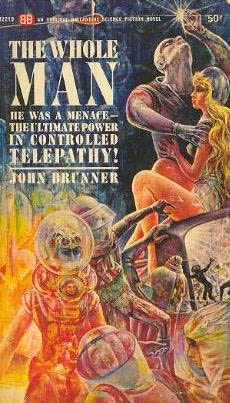
(Picture from here.)
I read a lot of John Brunner in the sixties and seventies. I found him lest interesting as time went on. The last book I read by him was The Children of the Thunder, which I didn't like at all. He's most famous for Stand on Zanzibar, a novel about overpopulation. I like SOZ fine but I think Harry Harrison's novel, Make Room! Make Room!, has a better take on the issue.
The Whole Man isn't a lot like Brunner's other works to my mind. Most of his other works, like a lot of science fiction in general, are about big issues: overpopulation (SOZ), the failure of humanity to encompass information (The Shockwave Rider), the failure of alien civilizations (Total Eclipse), etc.
TWM, by contrast, is completely driven by the characters. There is a backdrop of the world but the narrow focus of the novel on the individuals makes it a better work.
The synopsis: Gerald Howson is born during a period of civil unrest in, ostensibly, England. The unrest was quelled by the invasion of UN troops-- signifying a strong planetary role for UN pacification. He's born deformed, one shoulder higher than the other, one log longer than the other, etc. His mother doesn't really want him but doesn't want to risk getting rid of him, either. He grows up in this environment.
When he's about 20, his telepathic gift shows up and he uses it to tell stories to a deaf-and-dumb girl. Both of them are in danger of succumbing to what is called a catapethic grouping, when the power of the telepathist's projected images overcome the natural senses such as hunger, thirst. Such groupings can be fatal.
Howson is discovered and captured prior to this happening. He has been discovered by the raw power of his gift. His gift is a consequence of his deformity.
The story is in three parts: early life and discovery, some time later when he has learned how to use his power and the seminal case that shows how his life is essentially empty, the journey he makes to find out who he is and what he wants-- to become "The Whole Man" of the title. A good synopsis, but a poor review, can be seen here.
By and large it is not as well regarded as his other works. I find this astonishing.
TWM has its issues. Its biology is suspect even by the standards of the time. It is a bit mired in the psychological approaches of the time. It is, perhaps, a bit too episodic.
But it showed me a road in fiction that I found exciting.
My thinking is forcibly wedded to reality-- not necessarily a technological reality but a human reality. That means when I look around the world and see humans doing things and look in fiction I expect to see similar things. If I pick up a heroic fantasy where the hero beats all odds to bring down the king and rule in his stead, I expect all of the knock on effects of a coup as we have seen when kings in our world have been knocked down-- power vacuum effects, revenge by the family, changes of alliances, etc. If the king is knocked down and the hero lives happily ever after, my brain says fairy tale and goes on disappointed.
That is what makes TWM so interesting to me. Given the world of the novel, nothing happens to Howson that is not character driven. He is discovered by virtue of something he does. What he does derives from the austerity of his life. His resistance to learning to use his gift derives from his personality and needs. His failure to find fulfillment in that gift also comes from his personality-- he's satisfied one part of his life and not another. His final success, and the resulting gift from his friends, completes him in a satisfying manner. No world is save. No heroes. Nothing like that.
It is a journey to self, analogous to Jung's individuation. It is further made interesting because the telepathy itself modifies the individual, much like the ability to do higher mathematics or have great personal understanding or athletic ability modifies the personality of the individual.
I knew early on I wanted to write speculative fiction. I knew I wanted to write about moral decisions-- though I didn't really articulate the concept until much, much later. But TWM was the first novel that seemed to encapsulate what I wanted to do with my fiction.
It gave me a perspective on fiction I have used to this day.
=================================================
Wall of Idiots
Lies from the RNC
Lies from the DNC
Lies from progressives
Conservative lies about health care and breast cancer
Conservative response to Obama's school speech
CPR lies about health care
Eric Cantor's gender lies
Lies about stamps
Lies about China
Plastinated cadaver sex
Conservative sex ad
Catholic conspiracies
Ian Pilmer
Links of Interest
Happy Birthday, H. G. Wells!
Haumea and here
NASA Launch Systems
Light a gril in 30 seconds and here
Gene therapy for monkeys to get color vissiiooon
Salt and pepper battery
Levitating mice
Microwave cold spot artifact
The thankless job of the FDA
Steampunk Motorcycle
Weird things fall from the air
Give geoengineering a chance
DIY
Paper monster automata
Altoids Tin Bread Baker
Dress from a button down shirt
Beneficial bug houses
Bandaid in the woods
Downloadable papercraft
Low melt casting alloys
V: low cost rice thresher
Baskets from gas bottles
Sailboat in a closet
Small, precise holes
Gray water system
Pesto
Secret image sculpture
Carbonated beverages
Overboard rescue
Battling tops
Bamboo bike frame
Clean a knife
Filleting a fish



No comments:
Post a Comment